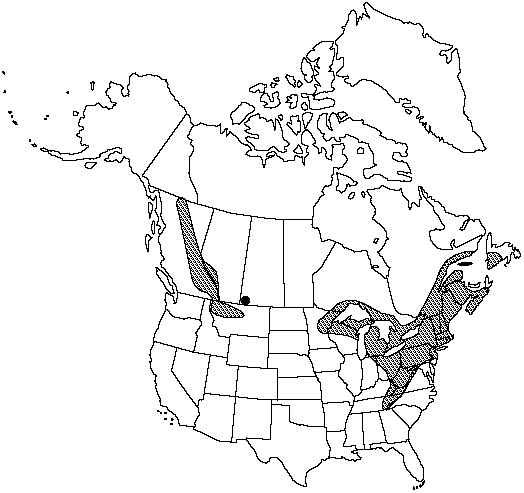familyOphioglossaceae
genusBotrychium
subgenusBotrychium subg. Botrychium
speciesBotrychium lanceolatum
Difference between revisions of "Botrychium lanceolatum subsp. angustisegmentum"
Bull. Torrey Bot. Club 64: 280. 1937.
Common names: Narrow triangle moonwort
Endemic
Basionym: Botrychium lanceolatum var. angustisegmentum Pease & A.H. Moore Rhodora 8: 229. 1906
Synonyms: Botrychium angustisegmentum
Treatment appears in FNA Volume 2.
FNA>Volume Importer |
imported>Volume Importer |
||
| (7 intermediate revisions by 2 users not shown) | |||
| Line 8: | Line 8: | ||
}} | }} | ||
|common_names=Narrow triangle moonwort | |common_names=Narrow triangle moonwort | ||
| − | |basionyms={{Treatment/ID/ | + | |special_status={{Treatment/ID/Special_status |
| + | |code=E | ||
| + | |label=Endemic | ||
| + | }} | ||
| + | |basionyms={{Treatment/ID/Basionym | ||
|name=Botrychium lanceolatum var. angustisegmentum | |name=Botrychium lanceolatum var. angustisegmentum | ||
|authority=Pease & A.H. Moore | |authority=Pease & A.H. Moore | ||
| + | |rank=variety | ||
| + | |publication_title=Rhodora | ||
| + | |publication_place=8: 229. 1906 | ||
}} | }} | ||
|synonyms={{Treatment/ID/Synonym | |synonyms={{Treatment/ID/Synonym | ||
|name=Botrychium angustisegmentum | |name=Botrychium angustisegmentum | ||
| − | |authority= | + | |authority= |
| + | |rank=species | ||
}} | }} | ||
|hierarchy=Ophioglossaceae;Botrychium;Botrychium subg. Botrychium;Botrychium lanceolatum;Botrychium lanceolatum subsp. angustisegmentum | |hierarchy=Ophioglossaceae;Botrychium;Botrychium subg. Botrychium;Botrychium lanceolatum;Botrychium lanceolatum subsp. angustisegmentum | ||
| Line 23: | Line 31: | ||
}}<!-- | }}<!-- | ||
| − | --><span class="statement" id="st- | + | --><span class="statement" id="st-undefined" data-properties=""><b>Plants </b>slender. <b>Leaf</b> base, including sheath, to 0.7cm diam., usually swollen only 1–3 times width of common stalk (dried). <b>Common</b> stalk dark brownish green, trophophore blade dark green, very shiny. <b>Segments</b> narrow, ultimate lobes narrowly linear-oblong, 1–2 mm wide, blade tissue thin but firm. <b>Pinnae</b> and lobes mostly sharply pointed. <b>Sporangia</b> 0.7–1 mm diam., slightly immersed, mostly ± separated and exposing sporangiophore midrib.</span><!-- |
-->{{Treatment/Body | -->{{Treatment/Body | ||
| + | |phenology=Leaves appearing in late spring or early summer, releasing spores later than most associated species, and dying as late as October. | ||
|habitat=Mainly in shaded woods | |habitat=Mainly in shaded woods | ||
|elevation=0–1200m | |elevation=0–1200m | ||
| − | |distribution=St. Pierre and Miquelon;Alta.;B.C.;N.B.;Nfld.;N.S.;Ont.;Que.;Sask.;Yukon;Conn.;Ky.;Maine;Mass.;Mich.;Minn.;Mont.;N.H.;N.J.;N.Y.;Ohio;Pa.;R.I.;Tenn.;Vt.;Va.;W.Va.;Wis. | + | |distribution=St. Pierre and Miquelon;Alta.;B.C.;N.B.;Nfld. and Labr. (Nfld.);N.S.;Ont.;Que.;Sask.;Yukon;Conn.;Ky.;Maine;Mass.;Mich.;Minn.;Mont.;N.H.;N.J.;N.Y.;Ohio;Pa.;R.I.;Tenn.;Vt.;Va.;W.Va.;Wis. |
|tables= | |tables= | ||
|references= | |references= | ||
| Line 37: | Line 46: | ||
-->{{#Taxon: | -->{{#Taxon: | ||
name=Botrychium lanceolatum subsp. angustisegmentum | name=Botrychium lanceolatum subsp. angustisegmentum | ||
| − | |||
|authority=(Pease & A. H. Moore) R. T. Clausen | |authority=(Pease & A. H. Moore) R. T. Clausen | ||
|rank=subspecies | |rank=subspecies | ||
| Line 44: | Line 52: | ||
|basionyms=Botrychium lanceolatum var. angustisegmentum | |basionyms=Botrychium lanceolatum var. angustisegmentum | ||
|family=Ophioglossaceae | |family=Ophioglossaceae | ||
| + | |phenology=Leaves appearing in late spring or early summer, releasing spores later than most associated species, and dying as late as October. | ||
|habitat=Mainly in shaded woods | |habitat=Mainly in shaded woods | ||
|elevation=0–1200m | |elevation=0–1200m | ||
| − | |distribution=St. Pierre and Miquelon;Alta.;B.C.;N.B.;Nfld.;N.S.;Ont.;Que.;Sask.;Yukon;Conn.;Ky.;Maine;Mass.;Mich.;Minn.;Mont.;N.H.;N.J.;N.Y.;Ohio;Pa.;R.I.;Tenn.;Vt.;Va.;W.Va.;Wis. | + | |distribution=St. Pierre and Miquelon;Alta.;B.C.;N.B.;Nfld. and Labr. (Nfld.);N.S.;Ont.;Que.;Sask.;Yukon;Conn.;Ky.;Maine;Mass.;Mich.;Minn.;Mont.;N.H.;N.J.;N.Y.;Ohio;Pa.;R.I.;Tenn.;Vt.;Va.;W.Va.;Wis. |
|reference=None | |reference=None | ||
|publication title=Bull. Torrey Bot. Club | |publication title=Bull. Torrey Bot. Club | ||
|publication year=1937 | |publication year=1937 | ||
| − | |special status= | + | |special status=Endemic |
| − | |source xml=https:// | + | |source xml=https://bitbucket.org/aafc-mbb/fna-data-curation/src/2e0870ddd59836b60bcf96646a41e87ea5a5943a/coarse_grained_fna_xml/V2/V2_631.xml |
|genus=Botrychium | |genus=Botrychium | ||
|subgenus=Botrychium subg. Botrychium | |subgenus=Botrychium subg. Botrychium | ||
|species=Botrychium lanceolatum | |species=Botrychium lanceolatum | ||
|subspecies=Botrychium lanceolatum subsp. angustisegmentum | |subspecies=Botrychium lanceolatum subsp. angustisegmentum | ||
| − | |||
| − | |||
| − | |||
| − | |||
| − | |||
| − | |||
| − | |||
| − | |||
| − | |||
| − | |||
| − | |||
| − | |||
| − | |||
| − | |||
| − | |||
| − | |||
| − | |||
}}<!-- | }}<!-- | ||
-->[[Category:Treatment]][[Category:Botrychium lanceolatum]] | -->[[Category:Treatment]][[Category:Botrychium lanceolatum]] | ||
Latest revision as of 21:24, 5 November 2020
Plants slender. Leaf base, including sheath, to 0.7cm diam., usually swollen only 1–3 times width of common stalk (dried). Common stalk dark brownish green, trophophore blade dark green, very shiny. Segments narrow, ultimate lobes narrowly linear-oblong, 1–2 mm wide, blade tissue thin but firm. Pinnae and lobes mostly sharply pointed. Sporangia 0.7–1 mm diam., slightly immersed, mostly ± separated and exposing sporangiophore midrib.
Phenology: Leaves appearing in late spring or early summer, releasing spores later than most associated species, and dying as late as October.
Habitat: Mainly in shaded woods
Elevation: 0–1200m
Distribution

St. Pierre and Miquelon, Alta., B.C., N.B., Nfld. and Labr. (Nfld.), N.S., Ont., Que., Sask., Yukon, Conn., Ky., Maine, Mass., Mich., Minn., Mont., N.H., N.J., N.Y., Ohio, Pa., R.I., Tenn., Vt., Va., W.Va., Wis.
Discussion
Selected References
None.
Lower Taxa
None.
... more about "Botrychium lanceolatum subsp. angustisegmentum"